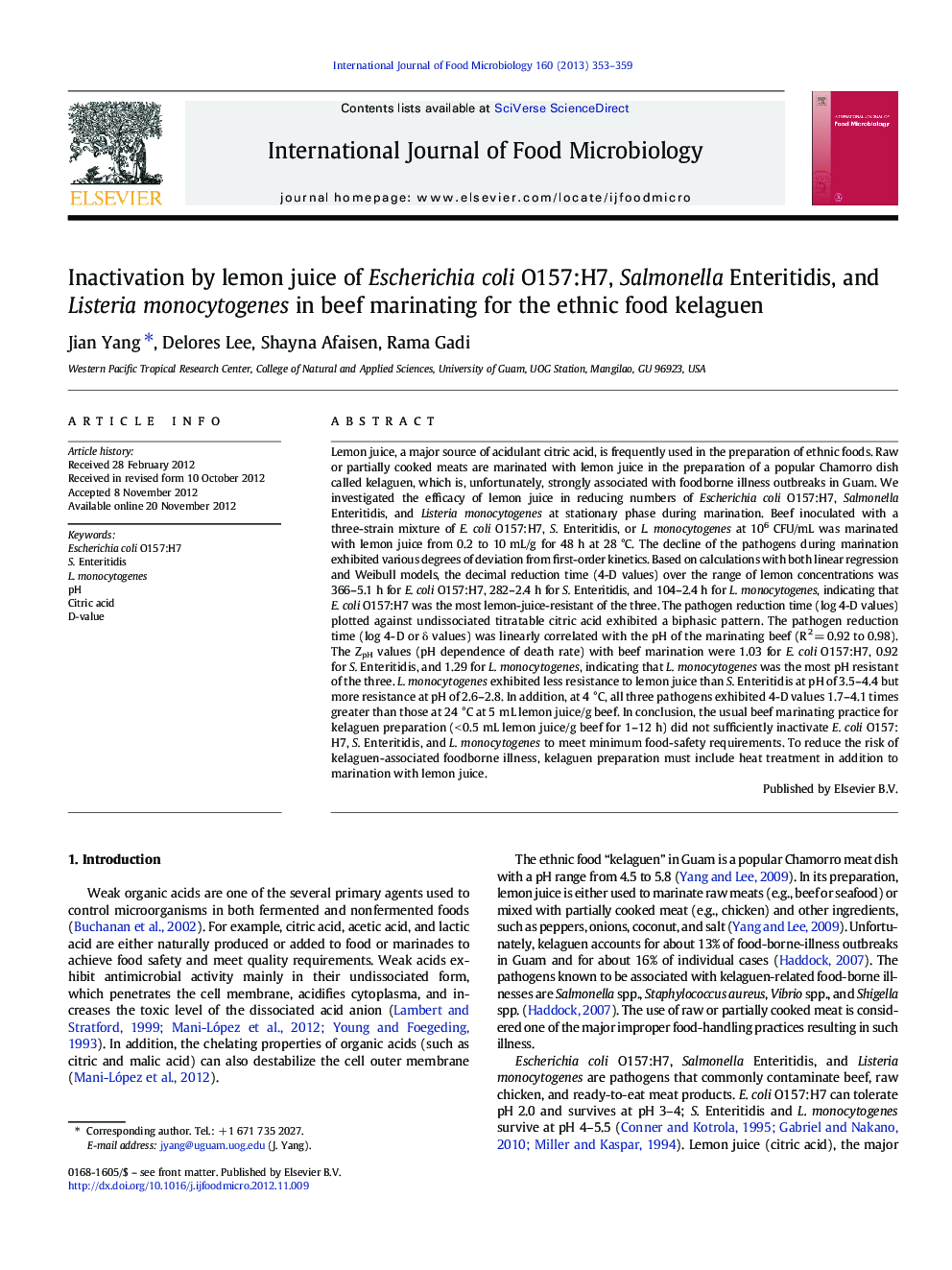| کد مقاله | کد نشریه | سال انتشار | مقاله انگلیسی | نسخه تمام متن |
|---|---|---|---|---|
| 4367310 | 1616633 | 2013 | 7 صفحه PDF | دانلود رایگان |

Lemon juice, a major source of acidulant citric acid, is frequently used in the preparation of ethnic foods. Raw or partially cooked meats are marinated with lemon juice in the preparation of a popular Chamorro dish called kelaguen, which is, unfortunately, strongly associated with foodborne illness outbreaks in Guam. We investigated the efficacy of lemon juice in reducing numbers of Escherichia coli O157:H7, Salmonella Enteritidis, and Listeria monocytogenes at stationary phase during marination. Beef inoculated with a three-strain mixture of E. coli O157:H7, S. Enteritidis, or L. monocytogenes at 106 CFU/mL was marinated with lemon juice from 0.2 to 10 mL/g for 48 h at 28 °C. The decline of the pathogens during marination exhibited various degrees of deviation from first-order kinetics. Based on calculations with both linear regression and Weibull models, the decimal reduction time (4-D values) over the range of lemon concentrations was 366–5.1 h for E. coli O157:H7, 282–2.4 h for S. Enteritidis, and 104–2.4 h for L. monocytogenes, indicating that E. coli O157:H7 was the most lemon-juice-resistant of the three. The pathogen reduction time (log 4-D values) plotted against undissociated titratable citric acid exhibited a biphasic pattern. The pathogen reduction time (log 4-D or δ values) was linearly correlated with the pH of the marinating beef (R2 = 0.92 to 0.98). The ZpH values (pH dependence of death rate) with beef marination were 1.03 for E. coli O157:H7, 0.92 for S. Enteritidis, and 1.29 for L. monocytogenes, indicating that L. monocytogenes was the most pH resistant of the three. L. monocytogenes exhibited less resistance to lemon juice than S. Enteritidis at pH of 3.5–4.4 but more resistance at pH of 2.6–2.8. In addition, at 4 °C, all three pathogens exhibited 4-D values 1.7–4.1 times greater than those at 24 °C at 5 mL lemon juice/g beef. In conclusion, the usual beef marinating practice for kelaguen preparation (< 0.5 mL lemon juice/g beef for 1–12 h) did not sufficiently inactivate E. coli O157:H7, S. Enteritidis, and L. monocytogenes to meet minimum food-safety requirements. To reduce the risk of kelaguen-associated foodborne illness, kelaguen preparation must include heat treatment in addition to marination with lemon juice.
► Pathogens decline during beef marination deviated variously from first-order kinetics.
► D-values of E. coli O157:H7, S. Enteritidis, and L. monocytogenes during beef marination.
► E. coli O157:H7 was more resistant to lemon juice than S. Enteritidis and L. monocytogenes.
► L. monocytogenes is more resistant to the pH change than E. coli O157:H7 and S. Enteritidis.
► Thermal treatment must be included in kelaguen preparation to ensure food safety.
Journal: International Journal of Food Microbiology - Volume 160, Issue 3, 1 January 2013, Pages 353–359